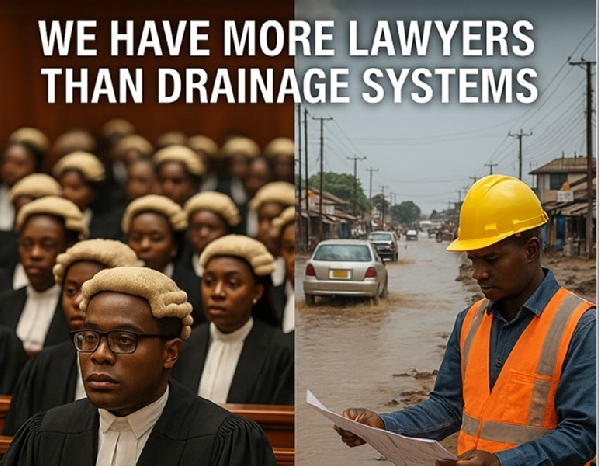The Message Behind the Satire
There’ s recent viral post that reads, “So You’re Telling Me We Have More Lawyers Than Functional Drainage Systems?”, may have been written in jest, but its truth cuts deep.
The humor exposes a structural imbalance in Ghana’s education and employment landscape: a nation producing lawyers faster than it produces engineers, scientists, or innovators.
This isn’t a jab at the legal profession—it’s a mirror held up to a society whose career aspirations no longer align with its developmental needs.
If Ghana continues to celebrate courtroom victories while losing the battle against infrastructural decay, unemployment, and technological dependency, we are headed toward a dangerous intellectual stagnation.
Flagbearer Race: Kwabena Agyapong’s campaign team reacts to GH¢4m development fee
The Consequence of Career Misalignment
Ghana’s labor market imbalance reveals a deeper crisis: we have more arguers than builders.
The consequences are visible everywhere:
• Infrastructure collapse: The lack of civil and structural engineers perpetuates poor roads, inadequate drainage, and unstable buildings.
• Brain drain: The few scientists we train are quickly absorbed abroad by systems that value their skills.
• Youth unemployment: Over-saturation in the law and business fields leaves many graduates underemployed.
• Innovation vacuum: Without physicists, materials scientists, and technologists, Ghana remains dependent on imports even for simple tools.
We cannot continue producing professionals who only interpret rules when what the country urgently needs are innovators who rewrite the rules of progress.
The Prestige Paradox
This problem is cultural. Ghanaian society has long glamorized titles like Lawyer, Doctor, or Manager while undervaluing technical and craft-based work. Engineering students are often treated as “mechanics with degrees,” while artisans are dismissed as “uneducated.”
Yet, the true power of modern economies rests on technical mastery — not academic status. South Korea, Singapore, and Japan became industrial powers because their citizens valued competence more than credentials.
We cannot lawyer our way to industrialization. The next generation of heroes must be engineers who build bridges, scientists who create clean energy, and technicians who design solutions, not just advocates who draft petitions.
Decline of Scientific Thinking
The post’s revelation that Ghana now produces physics graduates in single digits per year is alarming. It symbolizes the erosion of systems thinking and analytical reasoning in our education.
Physics is not just another science—it is the backbone of every technological system: from power generation to medical imaging, telecommunications, and industrial design.
Without physicists, there can be no engineers; without engineers, there can be no sustainable development. Producing more lawyers than physicists is like building a city with judges but no architects.
Rebalancing Education with National Needs
To correct this intellectual misalignment, Ghana must urgently redesign its education–industry pipeline.
(a)Reform University Incentives
Universities must be rewarded not by how many degrees they issue, but by how many problems they solve. Funding should prioritize science, technology, engineering, and applied research.
(b) Incentivize STEM Enrollment
Offer scholarships, stipends, and employment guarantees for students in physics, mathematics, and engineering. Make it financially attractive to study what the nation actually needs.
(c) Rebrand Technical and Vocational Education
Polytechnics should be centers of innovation, not “last-resort” institutions. Every major city should have a national innovation hub tied to its technical university.
(d) Link Education to Industry
Every academic department must partner with companies, industries, or local governments to solve real-life problems. Graduate projects should produce usable inventions, not just theoretical dissertations.
(e) Cultural Reorientation
Through media, policy, and education reform, Ghana must rebuild respect for the professions that keep nations running — engineers, plumbers, coders, and scientists.
A National Wake-Up Call
The post ends humorously — picturing lawyers in wigs standing in floodwater suing the rain — but it’s a sobering truth. We’ve become a nation that debates what others build.
Development requires not more arguments, but more action. We need builders of systems, not keepers of protocols.
We must choose between:
• A Ghana where every pothole has a lawyer assigned to it, • Or a Ghana where no pothole exists because an engineer has fixed it.
Conclusion: From Prestige to Productivity
Ghana’s true transformation will come when young people aspire not only to be called “learned colleagues,” but to be remembered as nation builders.
Our universities must produce less courtroom rhetoric and more working prototypes.
The next time it rains and the city floods, may we have fewer petitions and more physics. Because no matter how passionate the arguments, you can’t lawyer your way to development.
Meanwhile, catch this week’s episode of Nkommo Wo Ho, packed with showbiz gist and street buzz here!
